Release Notes
Release Note is a document regarding the release of articles from stock. The Release Note enters into the Accounting. The Release Notes book is used to create, correct, record, and print.
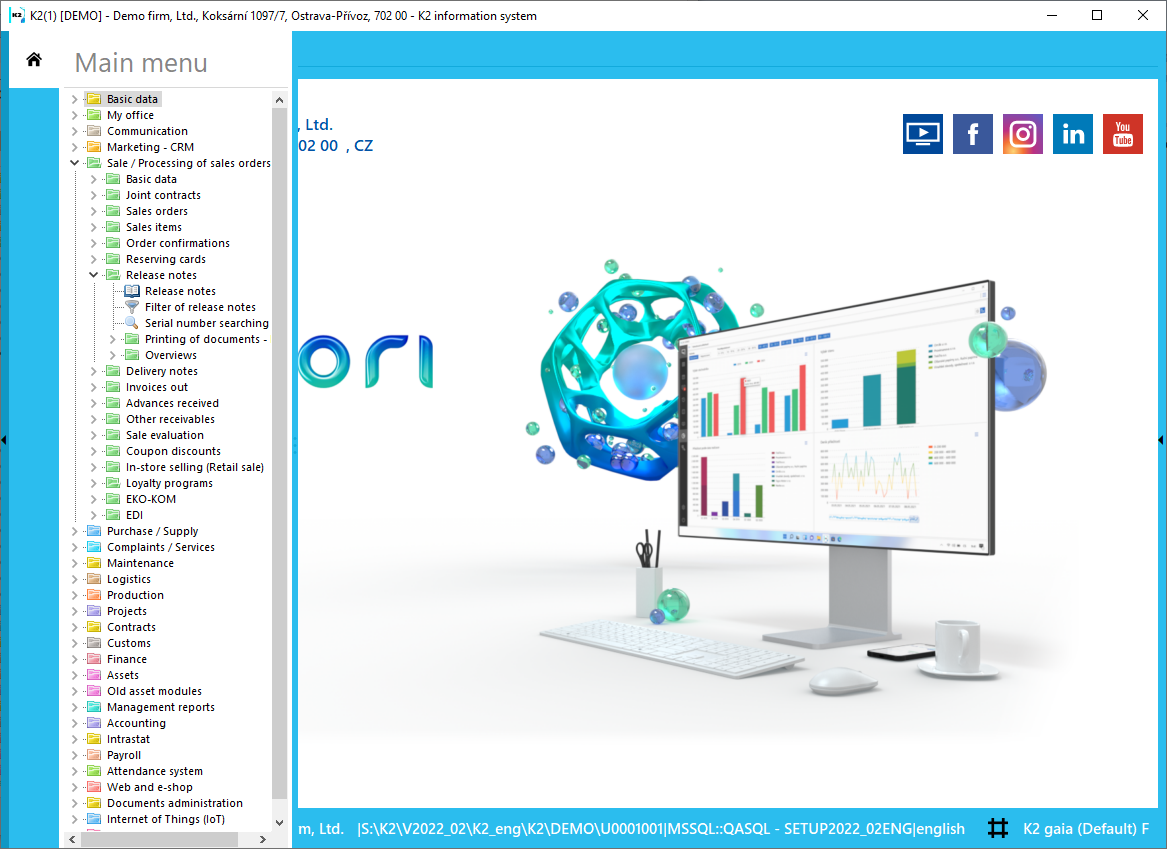
Picture: The open menu of the Sales / Processing of Sales Orders - Release Notes module
Book of Release Notes
Release Notes enable you to set double confirmation. This function is used in the so-called Expedition Warehouse. When using this methodology, you may perform the accounting release when the customer has paid the Invoice but did not pick up the articles yet. 1. The 1st confirmation of a Release Note will perform the accounting release, while the 2nd confirmation will deduct the articles from stock.
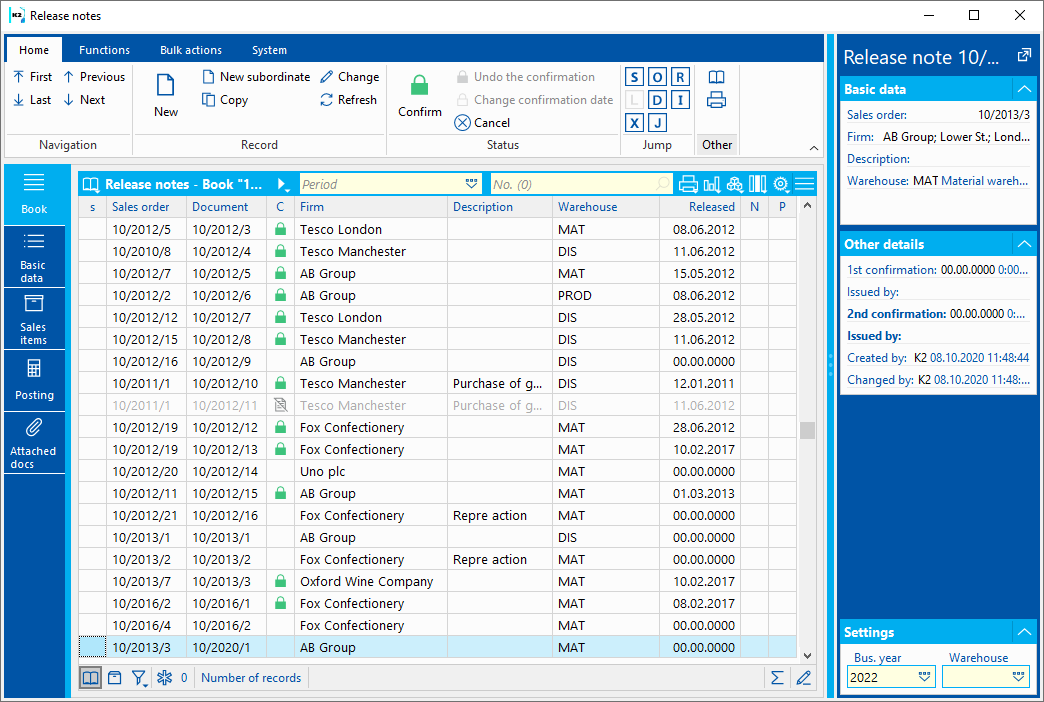
Picture: Book of Release Notes
Cancel a Release Note:
If a Release Note has already been saved (a number has been assigned to it), it cannot be deleted by any procedure. Only if it has not been confirmed yet, it can be cancelled. This may be done by pressing the F8 key. For a canceled release note, only the header with the cancellation flag remains in the database. The items of the Release Note will be deleted. If you eventually need to find out what content was stated at the Release Note before its cancellation (so as to check it), it is possible to find out from the Invoice Out that is bound to that Release Note.
Stock Price at Release Notes:
When you create a Release Note, the Stock Price from the Article card will be pasted into its stock price. This price can be changed. When confirming a Release Note , the Release Note stock price will be automatically rewritten by the price corresponding to the accounting calculation in the cases of the FIFO price and the Sliding price. The same applies for stock recalculation, where in the case of the FIFO price, Sliding price and Average price, this price is overwritten in confirmed Release Notes.
Release Note Document
Basic Data (1st page)
Basic Data tab contains information that is used to identification of the Release Note. If a Release Note is issued as a subordinate document, the data from the superior document that is from a Sales Order will automatically be added into the Release Note header.
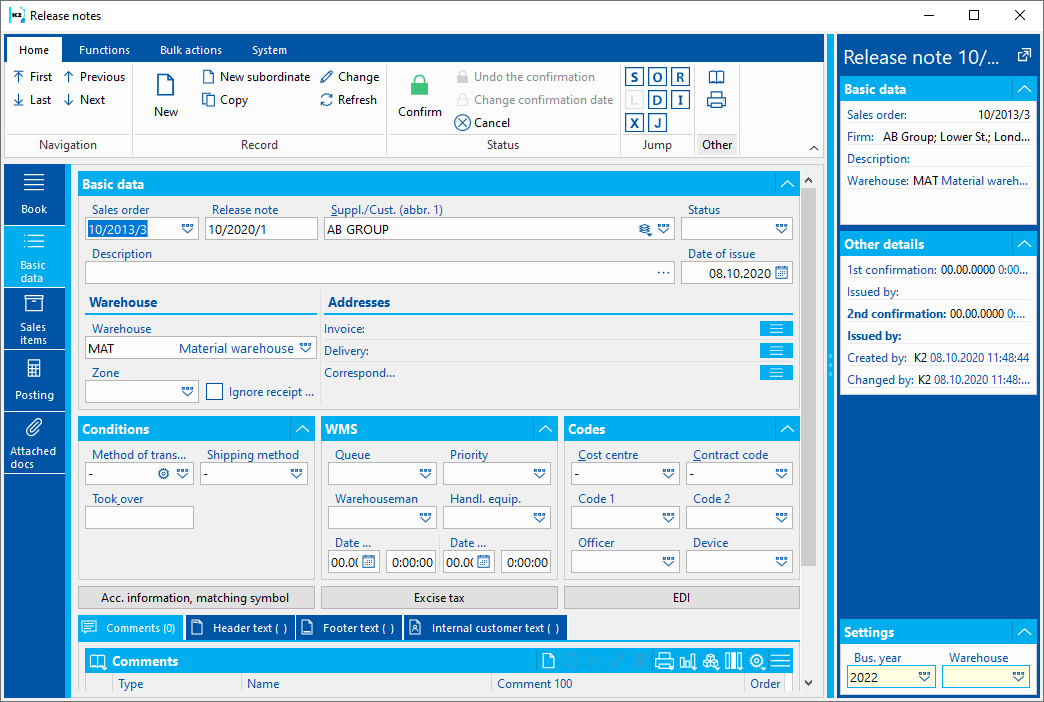
Picture: Release notes - Basic Data
Fields description in Basic data section:
Contract |
If a Release Note has been issued as a subordinate document, the Sales order number, which the Release Note is linked to, is displayed in this field. If a Release Note has been issued as a free document, this field is empty. |
Release Note |
The book, business year, and the number of a Release Note. |
Customer |
Name of the customer whom the goods were released to from the stock. This field includes a link to the Suppl./Cust. |
Status |
The field for selecting from a code list that enables filtering of documents according to the selected status. |
Description |
A random description of the document. |
Date of Issue |
The date of issue of the Release note. The current date is automatically filled into this field. If it is necessary, it is possible to overtype the date by another date. |
Warehouse |
The warehouse of a Release Note. Priorities of adding a warehouse into the header of a Release Note:
Physical Stock: this is seen in the lower status bar of the program, and before creating a stock document, it is possible to change it directly from the superior document by using the Alt+F10 keys on the 2nd page. |
Zone |
A warehouse zone from which the release will be executed. Selection of location in items is limited by the zone in the document header. |
Ignore Receipt Prices |
If this field is checked, the actual price of receipt items (negative items in the Release Note) is ignored and the article is valued as the release, i.e. according to the method of valuation of the warehouse. |
Addresses |
The button to display an addressee or the superior company. Closer description is in the chap. Addressee. |
Fields description in Conditions section:
Shipping Method |
Shipping method of the released articles. |
Method of transport |
Method of transport of goods. Button |
Accepted |
The name of the employee who has accepted the goods. |
Fields description in Controlled warehouse section:
Queue |
The queue to which the document is assigned for processing. An example of a queue may be the division of warehousemen into certain groups. By entering the queue in the stock document, an order number for assigning to processing within the assigned queue will be generated when the document is saved. |
Priority |
The document priority for being added into a job queue. |
Warehouseman |
The person who has processed the document. A warehouseman is selected from the Officers book. |
Handling equipment |
Warehouse handling equipment (trolley, pallet truck, etc.) |
Date From / Date To |
The time interval indicating how long the warehouseman performed the logistic task (release). |
Fields description in Codes section:
Cost centre |
The abbreviation of the cost centre that has issued the Release Note. |
Contract Code |
Contract code. It is copied into the release note items. |
Device |
A reference to the Device book. It is copied from a Sales Order into the subordinate documents. |
Code 1, Code 2, Officer |
The fields enable user identification, and eventually a link to the Officers book. For further description, see the Basic Code Lists - Code 1, Code 2, Officer chapter. |
Description of the fields in the Accounting information button, matching symbol
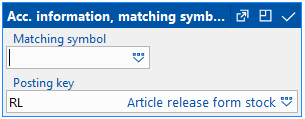
Picture: Release note - Accounting information, matching symbol
Matching Symbol |
This field serves for setting the matching symbol definition of the accounting documents (see the Accounting - Matching Symbols chapter). |
Posting key |
The posting key of a release note. If you do not enter a posting key in the items of a release note, then this posting key will be inserted into the particular items of the document when confirming this document. |
Description of the fields in the Excise Tax button
The Excise Tax tab contains a recapitulation of the excise tax.
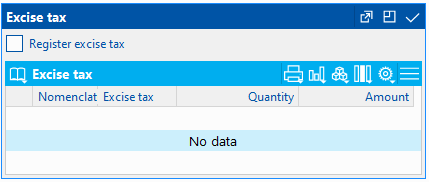
Picture: Release Note - Excise Tax
Fields description in Preview
1st confirmation |
The date and the hour of the 1st confirmation of a release note including person, who has confirmed the document. |
2nd confirmation |
The date and the hour of the 2nd confirmation of a release note including person, who has confirmed the document. |
Created by |
The name of the employee who has issued the document. |
Changed By |
The date and the name of the user who made the last change. |
It is possible to assign random types and kinds of notes to Release Notes, or you can use the Header Text and Footer Text tabs. Further work description with The notes is listed in the Basic Code Lists and Supporting Modules K2 – Notes chapter The Internal Customer Text tab serves to display the customer's internal text. There are also the Tasks and Activities tabs.
Items (2nd Page)
Sales Items tab contains a list of items to which the release note was issued. We insert a new item in the Change or in the New record by key Ins. If you issue an unassigned document, the Sale item form is displayed, into which you select a required article and enter the required data. If you issue assigned document, after pressing Ins select the items from the Header Items book. All items that are put on the Sales Order, but a Release Note has not been issued for them yet, are stated here.
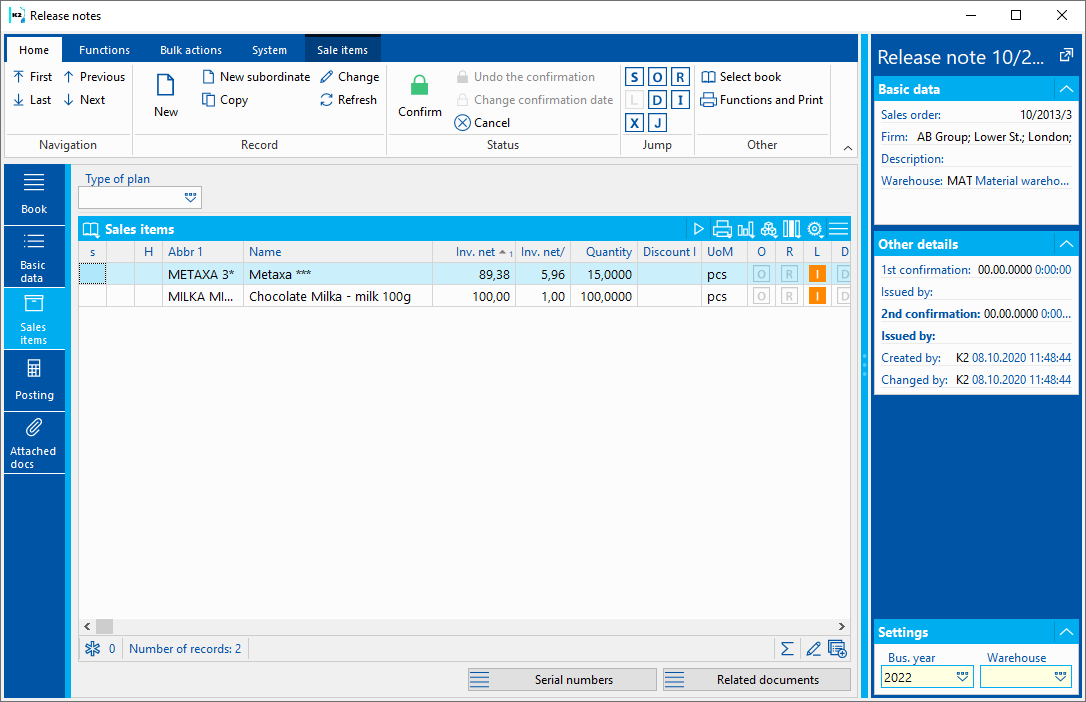
Picture: Release notes - Sales item:
The Sale Item form can be also activated by pressing the Enter key on the individual items of a Release Note either in the Change mode or in The Browse mode. In addition, the Change mode allows you to edit the data about the quantity, add codes, etc.
Values in the document items, including discounts, can be adjusted in bulk with the Bulk Change of Items button in the Change mode. For further description of this function, see the Bulk Edit Document Items and Purchase and Sale Items chapters.
Serial numbers are defined on the 6th page of a Release Note. A detailed description of work with serial numbers in stock documents is provided in the chapter Shared Purchase and Sale Elements - Serial Numbers.
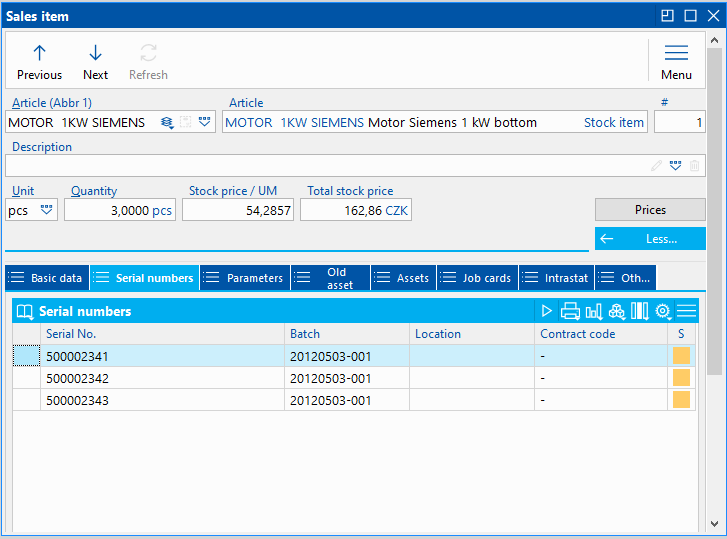
Picture: Release notes - serial numbers
Posting
The Accounting tab on the Release notes is used for Account assignment and posting of the document. This issue is described in detail in The Accounting - Account Assignment and Posting chapter.
Attached Docs.
On the Attachments tab, it is possible, as in other IS K2 documents, to insert documents or processes. The further description of the work with this page is stated in the Basic Code Lists and Supporting K2 Modules - Attachments - Connection and links chapter.
Functions of the Release Notes Module Menu
Bulk Actions - RELEASE NOTES
Bulk actions can be run on the records marked with asterisks or on the records in container.
Functions for Release Notes
Alt+F5 |
Change the stock price on a confirmed document (2nd page, Browse mode). |
Alt+F6 |
Release from a handling unit. The function serves to insert all items from the selected handling unit into the document (page 2 in the Change mode). |
Ctrl+F5 |
Change the confirmation date. Check negative stock levels option allows you not to change the date in the event that there should be a negative stock level in the stock record. Users which have not the right Code lists / Articles / Set "Negative stock level allowed" checkbox have this option activated and can not edit it. Note: Negative level in serial number records is not checked. |
Ctrl+F6 |
Assign batches and locations into the items of releases (page 2 in the Change mode). The functionality is identical to the functionality of the program when the option Assign batches and locations to releases when saving is activated in the specific Book of Sale. |
Ctrl+Shift+F6 |
For the current marked item, it opens the form of Wizard of the stock record and allows to enter the selected combination manually (contract code + batch + location + handling unit) to the document item directly from the rows of document items. (2nd page, in the Change mode). |
Alt+Shift+F2 |
Confirmation of a stock document with the negative stock level control off. If there is an Article card with serial numbers record on the document, the serial numbers are not solved (i.e. the status of serial numbers in stock level is not updated). On such a document, there is a flag that indicates that the document contains incorrect serial numbers - there is the icon The function implementation is always logged into changes. The function is accessible to the users that are authorized in the Code Lists / Articles / Set "Negative Stock Level Allowed” checkbox section only. |
Ctrl+Shift+F2 |
Undo the confirmation of a stock document with negative level control off. If there is an Article card with serial numbers record on the document, the serial numbers are not solved (i.e. the status of serial numbers in stock level is not updated). On such a document, there is a flag that indicates that the document contains incorrect serial numbers - there is the icon The function implementation is always logged into changes. The function is accessible to the users that are authorized in the Code Lists / Articles / Set "Negative Stock Level Allowed” checkbox section only. |
Ctrl+Alt+F5 |
The function enables to choose the document Status. |
Reports - Release Notes
Release Note
Process No.: EXP003, SKL002 |
Report ID: SZAK043 |
File: VYD_DOK01='AM' |
Report description: Release Note. The report enables to save parameters in an "*.xml" file. Bulk export into the "*.pdf" file and sending by email is possible. |
||
Address in the tree: [Sale / Processing of Sales Orders] [Release Notes] [Print Documents - Lists] [Logistics] [Release Notes] [Printing of documents - Lists] |
||
Report parameters:
Assignment - No Yes - displays document posting (data from the 3rd page of the document). |
BarCode - No Yes - a bar code is displayed. |
Batch - No Yes - batches for an item are displayed. |
BatchAttr - 0 0 - nothing is displayed; 1 - batch parameters are displayed; 2 - required batch parameters are displayed. |
BusinessRegister - 1 Information about the Business Register from the Own Company Settings is displayed. 0 - does not display information about the Business Register, 1 - displays a maximum of two lines of text about the Business Register, 2 - displays a maximum of four lines of text about the Business Register. |
CodeAndCentre - 0 The cost centre and the code are displayed according to the settings: value 0 - nowhere, 1 - in the header, 2 - in items, 3 - in both places |
CombineOrigItem - Yes Yes - merges the items with the same "OrigItemF" (if it is not different in price and other attributes). |
Contacts - 1;Addr;TaxNum;Tel1;Fax1;Email1;WWW The parameter has a total of 10 positions, the first three are fixed: 1. position: a user whose contacts from the user card (telephone, mobile, fax, email) are printed. Options: 0 - no user contacts, 1 - the user who has issued the doc., 2 - the currently logged in user, who prints the documents. 2. position: "Addr" - if it is specified, a company address is displayed. 3. position: "TaxNum" - if specified, the ID-No. and VAT Reg. No. are displayed. 4th - 10. position: listed types of electronic addresses of the own company (i.e. there may be up to 7 types). Example: (Contacts - 1;Addr;;TEL1;FAX1;WWW1): The Company Address will be displayed, behind which are the contacts from the user card, (tax numbers are skipped by an empty string on the 3rd place), then there are electronic addresses with Tel1 type, Fax1, WWW1. Note: If one piece of data is suppressed, there is no vacancy. Nevertheless, the default order in the report is always as follows: address, Tax No., user contacts, entered electronic addresses of own company. |
DefaultExport - No This is described along with other export parameters in the Report Parameters for Bulk Sending via E-mail chapter. |
Description - Yes Yes - displays information from the Description field on the 1st page of the document. |
DescriptionFromItem - Yes Yes - a supplement that is entered into the Description field in a document item is displayed. |
Discount - Yes Yes - a discount entered in item is displayed. |
DraftLabel - Yes Yes - if a document is not confirmed, "DRAFT" text is displayed in the background of a report. No - "DRAFT" is not displayed. |
Export_... - various parameters The report also includes export parameters described collectively for all documents in the Report Parameters for Bulk Sending via E-mail chapter. |
Interactive - No No - an initial form to enter parameter values is displayed. |
JCKindItem - A list of kinds that are printed in a tree of Job Cards (you have to separate more kinds by a semicolon). |
JCTreeLevel - 1 0 - all the levels of Job Cards are displayed for items, 1 - without Job Cards 2,3,4... - number of levels. |
KeepEnvelopeFormat - No No - the blank space under a place for envelope window is hidden. The saved place is multiplied, if the "ShowBarCode" parameter is set on "No". Useful if the user does not use the window envelopes and does not want to fold the printed document into an envelope according to the cam line guide of a document. Yes - the place is not hidden - the line between items and the address part will always be in one third of the page. |
LangAccordToParams - No If the report has to be printed in a language that is set in the "Field Language" and "Report Language" parameters, you have to set the value of the parameter to "Yes". |
LeftEnvelopeWindow - No Yes - the address of a customer is printed on the right side (determined for sending documents by mail in abroad where a window for envelope is on the left side); No - the address of a customer is on the left side. |
LeftShift - 5 By how many mm the edge of the report is shifted to the left (sets the print on a printer). |
Location - No Yes - the location is displayed. |
LogoPictureFooter - 0 Parameter adjusts the footer logo display. If the parameter is empty, a logo according to the setting of the Footer picture parameter in the Administration - setting of own companies function will be displayed. 0 - nothing is displayed, but a place is kept vacant (for a header paper), 1 - neither picture nor free place. File name with png suffix - specific picture in the Pictures directory of the given company. |
LogoPictureHeader - Parameter adjusts the header logo display. If the parameter is empty, a logo according to the setting of the Header picture parameter in the Administration - setting of own companies function will be displayed. 0 - nothing is displayed, but a place is kept vacant (for a header paper), 1 - neither picture nor free place. The conditions are to set the parameter KeepEnvelopeFormat to No. Name of a file with png suffix - specific picture in the Pictures directory of the given company. |
NumberOfDocOnItem - 1 0 - nothing is displayed, 1 - a Release Note number is displayed for an item, 2 - a Delivery Note number is displayed for an item. |
NumberOfItem - 1 0 - no number is displayed, 1 - number of a sales order item is displayed; 2 - order number is displayed. Always in the "#001" format. |
OneLineItem - No Yes - the document item is always displayed on 1 row. |
Price - 0 0 - no prices for the items are displayed, 1 - the planned price is displayed, 2 - the invoiced price is displayed, 3 - the stock price is displayed. |
ProportionalFont - Yes Yes - supplements are displayed in the Verdana font type, No - CourierNew font type. |
SerialNumber - No Yes - displays the serial numbers at the items. |
Sign - @Vyst;;; The parameter contains 5 positions: 1st position determines the person whose signature should be displayed. It may be a picture named according to the Logname of the user who has issued the document (@Vyst) or who prints the document - i.e. according to the current login (@akt) or the current Logname. The image must always be in the format Logname.png and placed in the Pictures directory. 2nd position: picture height. 3rd position: distance from the left edge. 4th position: distance of a picture from the upper edge of the given section. 5th position: picture width. Example: (Sign - @vyst;27;47;0;83) prints the signature of the user who has issued the document, height is 27 points, left indentation of 47 points, by the upper corner. The picture is 83 points wide. |
SortBy - The field is filled with the value of the field from Sale items (e.g. C_Zbo;Zkr or CF_CeJePlM). Items on a document will be sorted according to the parameter value. Parameter is empty by default. If the value of this parameter is specified, the items are not combined even if the CombineOrigItem parameter is set to Yes. |
StateOfOrigin - No Yes - a code of tariff and a country of origin are displayed for the items. If it is filled on a batch, information from the batch are displayed; otherwise the data from the Article card are displayed. |
SupplierCode - No Yes - the supplier code is displayed |
SupplFromArticles - 0 0 - Nothing is displayed, Empty value - a Business text from an Article card is displayed, otherwise the entered type of a supplement from the Article card will be displayed (e.g. the DB type). |
SupplFromCustomer - DZ 0 - Nothing is displayed, Empty value - Business text from the Customer card is displayed, otherwise the entered type of a supplement from the Customer card (e.g. supplement of the DZ type) is displayed. |
SupplFromItem - TX A type of a supplement entered on an item of a document is displayed. |
SupplFromClient - TEXT The TEXT value displays information from the General information field from an own company. Otherwise it displays supplement type from the Client parameters. |
Title - The entered value of the parameter is displayed as a report title. If the parameter is empty, the original name of a document is printed (e.g. Invoice). |
TotalAmount - No Yes - information about the total amount is displayed. |
TotalItems - No Yes - information about the total number of items is displayed. |
Warranty - No Yes - the number of months of a warranty from an item is displayed. If there is the value '999' entered in an item, the text "Lifetime" is displayed. |
Weight - No Yes - the weight of individual items and the total weight of a "document" are displayed. |
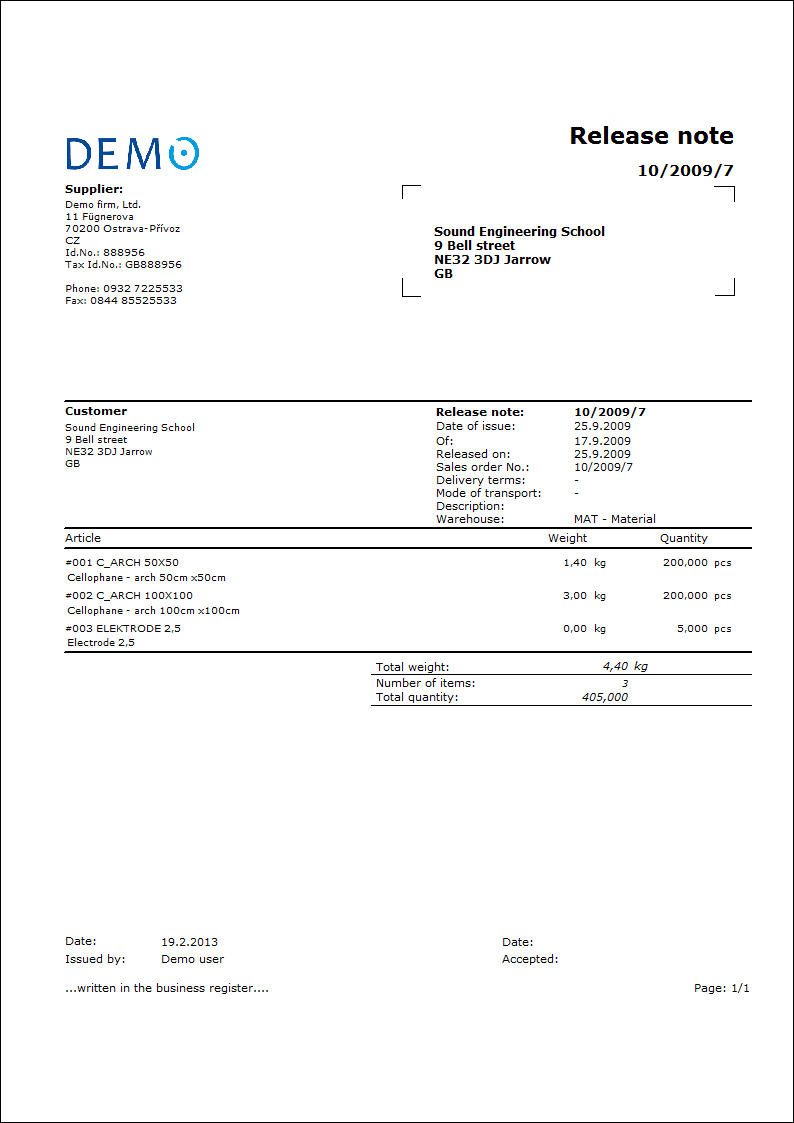
List of Release Notes
Process No.: EXP003, SKL002 |
Report ID: SZAK046 |
File: VYD_SEZ01='AM' |
Report description: List of Release Notes. |
||
Address in the tree: [Sale / Processing of Sales Orders] [Release Notes] [Print Documents - Lists] [Logistics] [Release Notes] [Printing of documents - Lists] |
||
Report parameters:
ShowPrices - No Yes - information about the price is displayed. |
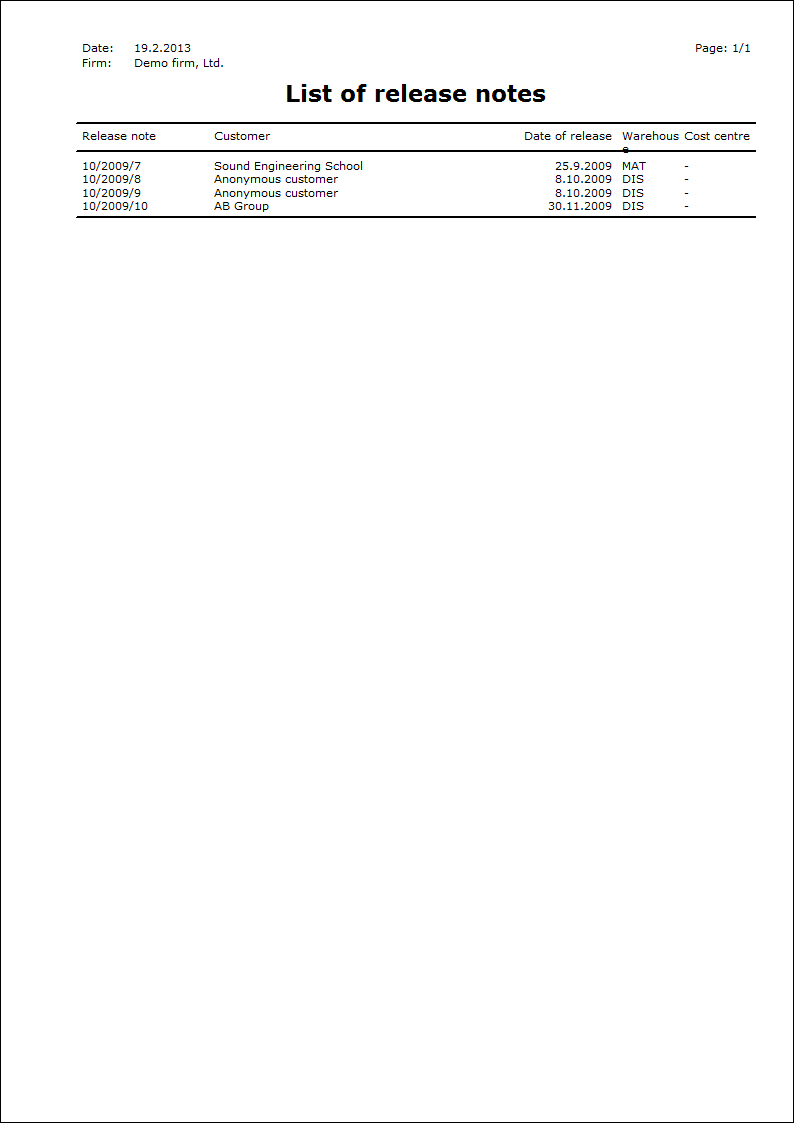
 next to the Method of transport field is mainly related to eshop. If there is an article where the
next to the Method of transport field is mainly related to eshop. If there is an article where the